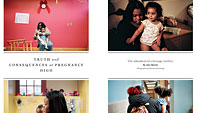
1.The Economist’s Free Exchange blog proposed an interesting theory based on Jennifer Senior’s story about how hard times could make New York a kinder and gentler place to live (“Recession Culture,” May 18): “Ms. Senior cites evidence that New Yorkers are spending more time volunteering, going to museums, and caring for their children. But that may be because they have more free time and the value of their labour has fallen. If you no longer have to rush to work, why not stroll through the park, help an old lady across the street, and take in a museum? New Yorkers may not be genuinely nicer people than before, they may just have more time to be better neighbours.” On nymag.com, one reader argued that the problems of New York are all the fault of people who aren’t from here and that as soon as they all leave, everything will be just fine: “As a boomer born/raised/educated in Manhattan, I can attest to the fact that NYC wasn’t always defined by Wall Street culture. And I can also attest to the influence of those who have arrived here from elsewhere, calling themselves New Yorkers—and the suburban commuting crowd—on the real culture of New York City. It has not been for the better. So, methinks a correction is in order. And if the parasites want to leave, so be it.” Now, that doesn’t sound very neighborly. Many readers cited evidence in their own social circles that supported Senior’s thesis: “I have seen many positive things coming out of the recession. Among my unemployed friends, I have seen some take up new passions, improve their health through exercise and healthier home cooking, and derive emotional well-being by giving back in their communities.” Which prompted another reader to write: “This is total bullshit. I am unemployed. There are no positives when you can’t afford to feed yourself.”

2. Alex Morris’s profile of a teenage mother and the specialized public high school she attends (“Truth and Consequences at Pregnancy High,” May 18) set off a debate in the comments section about poverty and personal responsibility. On one side were those who believed that the young parents in the story are their own worst enemies: “It just breaks my heart to see the low expectations for their lives that lead these girls to make self-destructive choices that in turn drain our tax dollars and social-services infrastructure,” wrote one reader. The counterargument was that these are just children, after all, who need guidance: “This isn’t about anyone’s values, and it’s certainly not about these teenagers’ choices. Christ, what fool expects a 14-year-old to make good choices? Have you ever even been 14? The issue here is education—or a lack thereof—specifically comprehensive, universal sexual-health education.” Another said the intractability of urban poverty made teenage pregnancy an attractive option: “Pregnancy is avoidable, but the thing is, a lot of these kids don’t want to avoid it. It is so normal to them, and they don’t believe poverty is inescapable, so why not have a baby that will love you, since education and work hold no promise?” All this talk inspired the main subject of the story, 17-year-old mother Grace Padilla, to weigh in herself. “I would just like to say that contrary to what you read, I am a very educated teen mother and would like everyone to know that yes, I live in a high-poverty area, but I will strive to escape the area I am in. I personally don’t think many of you know anything about teen pregnancy, and instead of following statistics, maybe you should take time out to actually talk to an educated teen mother.”
3. Will Leitch’s examination of the media’s drubbing of the author of A-Rod: The Many Lives of Alex Rodriguez (“Intelligencer: 330 Minutes With Selena Roberts,” May 18) caught some of the same flak that had been directed at Roberts: “You’re right, why should anyone dare question a journalist whose reputation has been forever tainted and whose whole long-winded blog of a book is based on ‘anonymous sources’? It’s not like Selena did some kind of heroic investigative journalism here.”
Send correspondence to: [email protected]